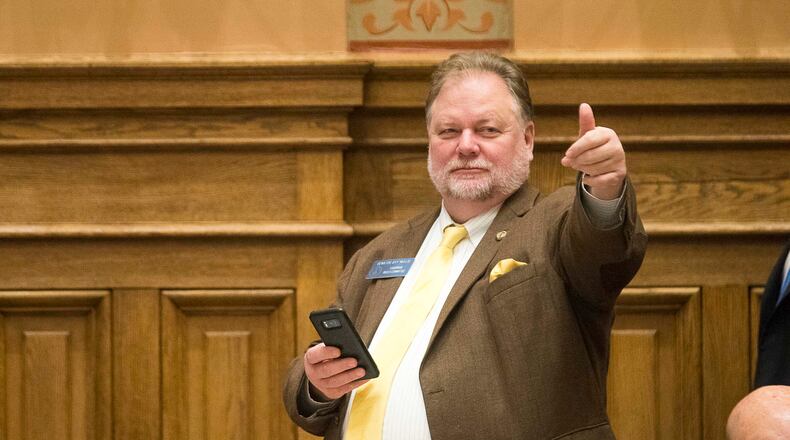In recent weeks, Chickamauga Republican Jeff Mullis — chairman of the powerful state Senate Rules Committee — successfully pushed legislation creating new committees for the governor and legislative leaders to raise unlimited campaign funds from lobbyists and special interests.
On Wednesday, Mullis moved to eliminate an amendment some of his fellow Republicans made that would ban such contributions during General Assembly sessions.
After getting pushback from his committee and failing to win support, Mullis said, “We are going to table this bill and I will have my say later.”
Mullis’ committee decides which bills get a vote before the full Senate. It can also alter or kill any piece of legislation.
Only two days earlier a Senate committee had moved to blunt some of the criticism Republicans have been receiving for creating Mullis’ new fundraising committees for legislative leaders. It amended an ethics bill to ban those funds from raising campaign money during General Assembly sessions.
The House last week gave final approval to Mullis’ legislation that would give Gov. Brian Kemp and legislative leaders the ability to raise unlimited campaign money during General Assembly sessions.
Senate Bill 221 passed largely along party lines, with Democrats saying it could increase the likelihood that Statehouse lobbyists would be asked to give money at the same time they were trying to persuade lawmakers to pass or quash legislation of interest to their clients.
On Monday, Senate Majority Whip Steve Gooch, R-Dahlonega, got an amendment put on House Bill 333, a separate measure requested by the state ethics commission, to add a provision outlawing committees or funds connected to lawmakers from raising contributions during a session.
When Gooch on Wednesday asked Mullis why it had been taken out of the bill, he didn’t get much of an answer.
“What you added the other day, we’ve moved past,” Mullis said without explaining why. He also didn’t turn Gooch’s microphone on in the meeting, preventing the public from clearly hearing what he was saying.
Gooch responded by saying “it sets a terrible precedent” to allow elected officials or groups to accept contributions during a session. His amendment, he said, “closes a loophole in Georgia law.”
State lawmakers for decades have been banned from taking campaign contributions from lobbyists and special interests during the session. Long ago, the General Assembly said it looked bad for a lawmaker to take a check at the same time he or she is considering legislation or funding that the donor may be trying to get approved or killed.
But caucus funds that raise money to support GOP candidates, such as the House Republican Trust and its Senate counterpart, are legally allowed to take money during sessions. The Senate fund, however, in recent years stopped raising money during the session after a change in the chamber’s rules prohibited it.
The House Republican caucus has continued to raise money during the session, and House Republicans have not sought the kind of prohibition Gooch proposed.
SB 221 — which is awaiting Kemp’s signature — would let a governor, lieutenant governor, a party’s nominee for either of those positions, and House and Senate Republican and Democratic leaders create such committees, which would raise money either for their own races or to try to affect other contests.
Statewide candidates are allowed to raise about $18,000 per election cycle if they make a runoff — $7,100 in legislative races — from individual donors.
Limits on how much donors could give to the committees would not apply, nor do they for caucus trusts. So contributors — typically lobbyists, industry associations or businesses interested in legislation or state funding — can give as much as they like.
Old-timers at the Capitol remember when lobbyists seeking to pass legislation could go onto the legislative chamber floors or into ante rooms and buttonhole lawmakers. Back in the day, lawmakers regularly held fundraisers during the session.
In the early 1990s, lawmakers made it illegal for lobbyists and others to give campaign contributions to legislators during the session because, besides the possibility for corruption, it just didn’t look good.
But what went unsaid was that caucus trusts and other groups involved in the political process could still legally receive donations during the session, and they accept “dark money” — money where donors aren’t disclosed.
A review of campaign contribution reports last week by The Atlanta Journal-Constitution showed over the past five years, the House and Senate GOP caucus funds — which are controlled by House and Senate leadership — reported receiving more than $300,000 during legislative sessions, including big money from businesses and associations who had lobbyists working on bills during those sessions. The Senate trust has since discontinued the practice, and most of the $300,000 has flowed to the House Republican group.
Unless Gooch’s amendment wins final passage, the new leadership committees would likewise be able to solicit and take unlimited contributions from lobbyists and special interests during the session.
About the Author
Keep Reading
The Latest
Featured




